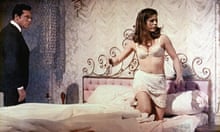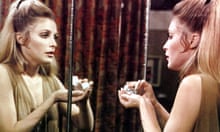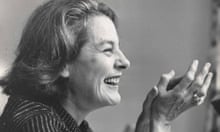Unlike other things that seemed like a good idea at the time but are revealed as pure folly with the wisdom of age - lovebites and Trotskyism immediately come to mind - books are becoming at any age. And the thrill of reading a particularly great one, though cheap, doesn't wear off: an old biddy gets the same kick out of the new Mary Wesley as a tot does out of Can't You Sleep, Little Bear? But most people have an especially soft spot for the first book they read while knowing they weren't meant to be reading it - the book you got your hot little hands on at the age of 11 or 12, and had to shove under the bedclothes PDQ when your mum put her head around the door to check on your virginal slumber. For earlier generations it may have been Forever Amber or Peyton Place. For my generation - for those lucky girls who came to maturity (or at least masturbation) on the shimmering 1960s/70s cusp - it was Valley Of The Dolls.
For a start, what a title! Like Lolita and Great Expectations, a few tiny words printed in all innocence on to a stack of bound paper would come to cast a giant shadow over the English language, become a part of 20th-century slang, a modern Morse instantly understood by millions who had never even seen the book. "Dolls" in fact refers to the arcane showbiz slang for tranquillisers, uppers and sleeping pills that help the three young heroines - one a model, one a singer, one a sex symbol and actress - to smooth the jagged freeways to the top of their professions. In the common imagination, though, they have come to represent the actual women: women so bound up in sex and money and performance that they seem in themselves to be some sort of heady, rare narcotic. You can see their echo in the celebrity magazines of today, in Carmen's eyes, Angelina's lips and Jennifer's BTM: women at once goddess-like and all too human.
Valley Of The Dolls can be enjoyed as the ultimate plush, trash, human-interest story - three decades of gossip columns distilled into one fat novel - but also as a document of some cultural interest, published as it was in 1966, but spanning the years from optimistic postwar 1945 to world-weary pre-deluge 1963. Kierkegaard's theorem that life can only be lived forwards and understood backwards has been used as an excuse to dignify a lot of silly, frivolous cultural frills and furbelows with far greater significance than they actually had - including the mini-skirt, Barbie dolls and atheism. But the sheer breadth and depth of this particular disco-ball gives it lasting clout.
Significantly, it was written by that rare thing, a novelist not castrated by an extended education. The not particularly talented nor attractive Jacqueline Susann left school in Philadelphia at 18 and went to New York to become an actress, an experience from which she must have emerged in a suitably raw, hysterical state to write this hyper-drama. She was able to write her book for the public, rather than for her peers and the critics. Because of this, Susann's book is not a 1960s feminist novel, thank God, in the tradition of such souped-up, dressed-down sob sisters as Doris Lessing, Margaret Drabble and Edna O'Brien, who also wrote of young women with an ambitious energy, which, due to the stonking gender inequality of the time, they ended up frittering away on destructive love.
Susann was different. She had a pizzazz and a common touch they all lacked. And neither was she a seen-it-all, elegantly shrugging jetsetter along the lines of Françoise Sagan and Jean Rhys, whose wild girls similarly ended up burned out on the bonfire of romantic illusions. No, there is indignation and anger in Susann's writing, a refusal to use irony or education as a wet blanket that might tastefully smother the lurid flames of her outrage over something that has now become a cliché - the fact that women are valued briefly for their beauty, bought and sold like prime cattle in the meat markets of entertainment, and cast aside when inevitably mugged by gravity. At the same time, men, even in showbusiness, are valued for the sum of their parts, rather than some of their parts.
Susann's heroines never acknowledge feminism for the simple reason that, between 1945 and 1963, it simply didn't exist. This was a time, remember, in which the most rebellious and highflying job a woman could aspire to was that of an air hostess. But their lives, even as they strive and succeed in winning fame and fortune, are miserable because of the bad hand women have historically been dealt when it comes to the balance of power. Furthermore, Susann's heroines are not shown as being the architects of their own misery for being ambitious. Their mothers - traditional housewives who disapprove of their drive and believe that status comes only from making an upwardly mobile marriage - are shown as joyless, bitter parasites. In another subversive sideswipe, you couldn't call the principal men heroes - not even the regrettably named English stud-muffin Lyon Burke. They are uniformly vile, weak bullies.
Virtuous women are not rewarded in JacquiWorld: the two decent, beautiful, irreproachably feminine heroines, Anne and Jennifer, end the book torn apart in body and soul, one dead, the other defeated, their youthful dreams shattered on the rocks of wrecking-crew male sexuality (as Susann sees it). But the oft described "monster" heroine, Neely - not a beauty, and spiteful, selfish and undisciplined - ends happily in her fashion because her talent keeps her essentially strong and true to herself. What a bold, modern message this is: "Guys will leave you, your looks go, your kids will grow up and leave you, and everything you thought was great will go sour; all you can really count on is yourself and your talent." And how refreshing, especially now, in a period of ceaseless being-a-mother-is-the-most-important-thing-in-my-life guff from the likes of Madonna and the rest of her smug showbiz sisterhood.
Like many mainstream entertainments, Valley Of The Dolls is far more critical of the American Dream than many avowedly "subversive" projects. As Dallas showed American big business to be corrupt and filthy through and through, so Dolls protractedly and minutely picks apart the "magic" of showbusiness. Broadway, Hollywood, Vegas cabaret and European "art" films are revealed as glitzy, gladiatorial arenas where women pull each other to pieces in search of that leading role or that modelling contract. Of course, like all the best tabloids, Dolls has its cake and eats it, too, and still has enough to throw triumphantly in the face of the showbiz establishment.
The US is a country where extreme licentiousness and terminal prissiness make strange bedfellows. Like Cecil B DeMille before her (show lashings of flesh, but then point out that it's happening in Sodom and Gomorrah, and kill the lot of them!), Susann had to make sure that the pursuit of pleasure led to the pincer of pain. Still, it was strong stuff for the 1960s, featuring the first mainstream anal sex scene, which mystified me for years. If the tragic outcomes of various hedonisms are sometimes piled on with a trowel, it still retains its power and a strange sort of accidental integrity. Despite nearly 40 years of repeated attempts to castrate it into campness, or kill it with kitsch, Valley Of The Dolls remains a brave, bold, angry and, yes, definitely a feminist book. All that, and still about the most fun you can have without a prescription.
· © Time Warner Books, 2003. This is an edited extract from Julie Burchill's introduction to the reissue of Valley Of The Dolls, by Jacqueline Susann, published on Monday by Virago priced £7.99. To order a copy with free UK p&p, call the Guardian book service on 0870 066 7979.



